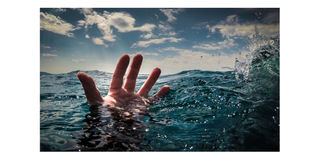Prime
Silent crisis: Urgent action needed as drowning, sewer accidents claim more Tanzanian lives

What you need to know:
- Drowning and unsecured sewer accidents are claiming more Tanzanian lives, with over 40 deaths this year alone and many cases going unreported
Dar es Salaam. Drowning at sea or falling into unsecured sewer systems and boreholes often goes unnoticed, yet the number of Tanzanians losing their lives in such incidents is rising, prompting calls for urgent action.
This year alone, more than 40 people have died in various parts of the country, including Dar es Salaam, available figures show.
According to Fire and Rescue Force and Water Department official Mr John Nyanda, the actual number could be higher, as some cases go unreported.
“In Dar es Salaam alone we have retrieved the bodies of more than 15 people, this year. In Rukwa, we recovered 12 bodies in January alone, and in Kigoma, we were also involved in recovering more bodies,” he said.
He attributed many incidents to a lack of public awareness.
“People go to the sea or rivers when weather conditions are unsafe. Others walk along unstable riverbanks, leading to fatal accidents,” he noted.
Even trained rescue professionals sometimes face difficulties during recovery operations, with challenging water conditions overwhelming them.
Mr Nyanda also voiced concern over the high number of children falling into sewer systems, as well as cases of infants being abandoned in sewers.
Many chambers, he said, are poorly secured, often covered with metal sheets or wooden planks that pose serious danger.
A Musoma fisherman, Mr Rashidi Ndenge, told The Citizen he survived a near-drowning but has witnessed many others lose their lives.
“I have seen relatives, friends, and many others in my home area die in the lake. Life is hard, and many young people come here to work as casual labourers in the fishing industry without knowing how to swim,” he said.
He added that many youths take up fishing without training or safety skills.
“One drowned after slipping, another after his canoe developed a hole and sank. Whenever such tragedies happen, we each contribute Sh1,000 to search for the body,” he explained.
Globally, the World Health Organisation (WHO) estimates that more than 236,000 people lose their lives to drowning each year, with over half the victims under the age of 30.
Most deaths occur during routine activities such as fishing and water-based transport.
In Tanzania, the national drowning rate is estimated at 2.2 deaths per 100,000 people.
However, a study in fishing communities along Lake Victoria revealed a much higher fatality rate of 217 per 100,000 people.
Alarmingly, 87 percent of adult deaths occurred while fishing from boats.
Gender Protection Officer for the Environmental Management and Economic Development Organisation (Emedo), Ms Hellen Gasper, said drowning often goes unnoticed as a public health concern, unlike malaria or road accidents.
“This is because drowning typically happens quietly and affects individuals, but it is a serious and preventable issue,” she said.
She added that Emedo runs the Lake Victoria Drowning Prevention project, which trains fishermen on drowning risks and places special focus on children.
Children are among the most vulnerable groups, with the highest drowning rates recorded among those aged one to nine.
WHO data shows that more than half of all drowning deaths occur among people aged 25 and under.
Drowning is the sixth leading cause of death globally for children aged five to 14.
Acting Manager of Seafarers Training and Certification for the Tanzania Shipping Agency Corporation (Tasac), Mr Lameck Sondo, said users of water vessels must follow existing laws and wear life jackets at all times.
“Collaborative efforts among various stakeholders are needed to find ways to reduce drowning incidents,” he said.
The government, he added, recognises the seriousness of drowning. “On Lake Victoria, we have ambulances and search-and-rescue boats to ensure immediate assistance in case of emergencies,” he said.
Tasac also conducts inspections in most areas near water bodies to provide alerts and reports.
However, non-compliance with safety measures remains a major cause of drowning.
A weather expert from the Tanzania Meteorological Authority (TMA), Mr Chuki Sangalugembe urged water users and owners of marine vessels to check weather conditions before entering the sea, ocean and river.
“People should also have swimming skills that can help them save themselves before rescuers arrive, and all water vessels should be equipped with life jackets,” he said.


